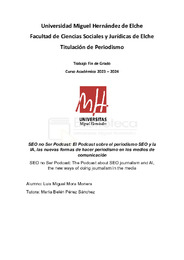Please use this identifier to cite or link to this item:
https://hdl.handle.net/11000/34013Full metadata record
| DC Field | Value | Language |
|---|---|---|
| dc.contributor.advisor | Pérez Sánchez, María Belén | - |
| dc.contributor.author | Mora Monera, Luis Miguel | - |
| dc.contributor.other | Departamentos de la UMH::Ciencias Sociales y Humanas | es_ES |
| dc.date.accessioned | 2024-11-25T12:58:23Z | - |
| dc.date.available | 2024-11-25T12:58:23Z | - |
| dc.date.created | 2024-09 | - |
| dc.identifier.uri | https://hdl.handle.net/11000/34013 | - |
| dc.description.abstract | El periodismo está cambiando, eso es una realidad, y nosotros somos parte de ese cambio. Las redes sociales, los nuevos formatos, la segmentación de la audiencia o el consumo rápido son factores que han contribuido a esta revolución. Además de todo lo mencionado anteriormente, hay dos claves que afectan a todos los medios de comunicación, y que son vitales para su existencia, mantenimiento y la creación de nuevos contenidos: el SEO y la Inteligencia Artificial. En mi corta pero intensa experiencia trabajando en el departamento de SEO y márketing de una empresa mediática, como es Prensa Ibérica, he podido aprender que el periodismo está dictado por la audiencia y sus preferencias, por la temporalidad de los temas y por ser el primero en todo. A pesar de la importancia del SEO en los medios, los estudiantes de periodismo no aprendemos nada sobre él, y creo que es fundamental tener conocimientos avanzados para entender hacia dónde va esta profesión. Si controlas el SEO, controlas tu posición en internet, y si controlas tu posición en internet, podrás conseguir todos tus objetivos. En un universo digital lleno de competencia, estar el primero en las búsquedas es la clave para tener visitas y, por ende, ganar más dinero. Aparte de todo lo mencionado anteriormente, la Inteligencia Artificial, más inteligente que nunca, será la que dicte cómo se tendrán que hacer las nuevas noticias, sobre todo, en el ámbito digital. ¿Es un sustitutivo del periodista? ¿Es una herramienta que será un segundo cerebro para los redactores? ¿La IA perjudicará la calidad de las piezas? Todas estas cuestiones las resuelvo en el primer episodio piloto del podcast SEO no Ser. En este documento sonoro abordo estos temas y trato con dos expertos las tendencias actuales del periodismo y descubro la cara oculta de los medios de comunicación que no se explica en las universidades. | es_ES |
| dc.description.abstract | Journalism is changing, that's a fact, and we are part of that change. Social media, new formats, audience segmentation, and fast consumption are factors that have contributed to this revolution. In addition to everything mentioned above, there are two key elements that affect all media outlets and are vital for their existence, maintenance, and the creation of new content: SEO and Artificial Intelligence. In my short but intense experience working in the SEO and marketing department of a media company like Prensa Ibérica, I have learned that journalism is driven by the audience and their preferences, the timeliness of topics, and being the first in everything. Despite the importance of SEO in the media, journalism students do not learn anything about it, and I believe it is essential to have advanced knowledge to understand where this profession is heading. If you control SEO, you control your position on the internet, and if you control your position on the internet, you can achieve all your goals. In a digital universe full of competition, being the first in searches is key to getting views and, therefore, earning more money. Apart from everything mentioned above, Artificial Intelligence, smarter than ever, will dictate how new news should be made, especially in the digital realm. Is it a substitute for journalists? Is it a tool that will serve as a second brain for writers? Will AI harm the quality of the articles? I answer all these questions in the first pilot episode of the podcast "SEO or Not to Be." In this audio document, I tackle these topics and discuss with two experts the current trends in journalism and uncover the hidden side of the media that is not taught in universities. | es_ES |
| dc.format | application/pdf | es_ES |
| dc.format.extent | 25 | es_ES |
| dc.language.iso | spa | es_ES |
| dc.publisher | Universidad Miguel Hernández de Elche | es_ES |
| dc.rights | info:eu-repo/semantics/openAccess | es_ES |
| dc.rights | Attribution-NonCommercial-NoDerivatives 4.0 Internacional | * |
| dc.rights.uri | http://creativecommons.org/licenses/by-nc-nd/4.0/ | * |
| dc.subject | Periodismo | es_ES |
| dc.subject | SEO | es_ES |
| dc.subject | Inteligencia Artificial | es_ES |
| dc.subject | Nuevas tecnologías | es_ES |
| dc.subject | Redacción Periodística | es_ES |
| dc.subject | es_ES | |
| dc.subject | Journalism | es_ES |
| dc.subject | Artificial Intelligence | es_ES |
| dc.subject | New Technologies | es_ES |
| dc.subject | News Writing | es_ES |
| dc.subject.other | CDU::0 - Generalidades.::070 - Periódicos. Prensa. Periodismo. Ciencias de la información | es_ES |
| dc.title | SEO no Ser Podcast: El Podcast sobre el periodismo SEO y la IA, las nuevas formas de hacer periodismo en los medios de comunicación | es_ES |
| dc.title.alternative | SEO no Ser Podcast: The Podcast about SEO journalism and AI, the new ways of doing journalism in the media | es_ES |
| dc.type | info:eu-repo/semantics/bachelorThesis | es_ES |

View/Open:
PER_TFG_ Mora_Monera_LuisMiguel.pdf
1,54 MB
Adobe PDF
Share:
.png)
